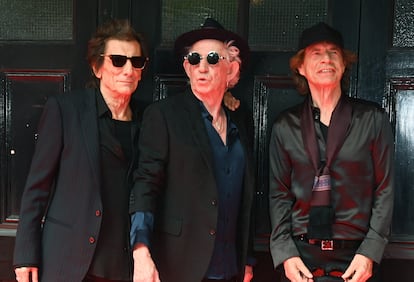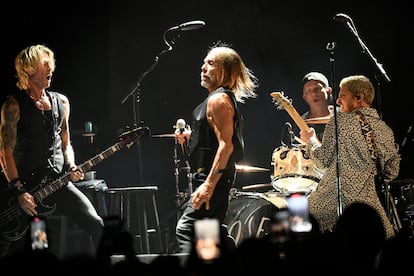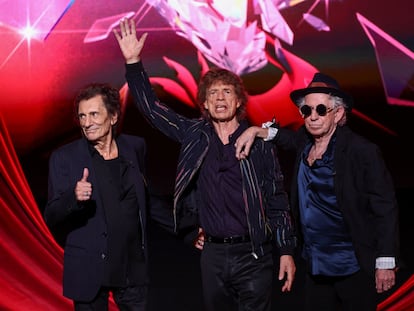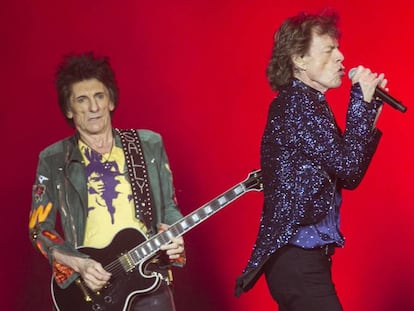The truth about Mick Jagger’s autotune in The Rolling Stones’ new song
The band’s latest track ‘Angry’ has sparked debate about whether the singer’s vocals have been modified, and what that says about the classic rock group


Classic rock fans’ worst nightmare has just come true. The new single by The Rolling Stones — the iconic rock and roll that has stayed true to the genre for decades — features autotune. That’s according to several experts, including Spanish producer and guitarist José Nortes. “You can hear it clearly after 30 seconds, when Mick Jagger starts singing: ‘It hasn’t rained in a month, the river’s run dry,’” he says.
Last Wednesday, The Rolling Stones presented Angry, the first song from their new album, Hackney Diamonds, which will be released on October 20. It is the band’s first original album in 18 years, since A Bigger Bang was released in 2005. In 2016, the band dropped Blue & Lonesome, but it did not feature original songs: only blues covers.
But the release of Angry — which was announced at a press conference hosted by comedian Jimmy Fallon — has sparked debate over how Jagger’s vocals have been manipulated with autotune. In an online forum hosted by sound engineer Steve Hoffman (who has worked on albums by the Beach Boys, Alice Cooper and Deep Purple), users were quick to debate the issue. “I have no problem with autotune per se. When it’s used to correct a note or two,” said one user. “But the whole ‘stick it on the whole track at maximum settings’ just sucks life out of the performance. Jagger sounds like an AI generated impression of himself.”
Autotune was born in 1996 as a tool to correct small tuning issues. In 1998, Cher revolutionized the tool with the song Believe, which sped up autotune and gave her voice a robotic sound. It was no longer a tuner, but rather another instrument. Today, it plays a key role in urban music, with Puerto Rican singer Bad Bunny leading the trend. But he’s not the only one. Indie musicians such as James Blake and Bon Iver or pop singers such as The Weeknd have also used it.
Autotune can be used at varying degrees of intensity, and in Angry, many listeners not accustomed to recording techniques may not even notice it. The question is whether Jagger used the tool to correct a vocal error or because he likes the sound. José Nortes believes that it was the latter. “It was deliberately made, without a doubt, to give it a modern feel. It’s not exaggerated, as it can be in reggaeton songs. Jagger may have used it once to correct something, as all singers do [...] Imagine you have an amazing vocal take, but there’s a mistake in a syllable. Then you correct it with autotune. But I think Jagger never used autotune deliberately to make his voice sound like it does in Angry,” says Nortes, who has worked with Spanish artists such as Miguel Ríos and Quique González.
The sound of producer Andrew Watt
The key name in this matter is Andrew Watt, the producer of the song and the entire album, which is made up of 12 songs. Watt’s contribution to Angry is so important that he is even listed as a co-writer, along with Mick Jagger and Keith Richards. Watt, a 32-year-old New Yorker, is one of today’s most-sought after producers. He has worked with rappers like Post Malone, pop stars such as Dua Lipa and Miley Cyrus, and has also been recruited by veterans such as Ozzy Osbourne and Iggy Pop. “Watt is one of the few people who combine rock with current sounds. He is the inventor of autotune rock,” jokes Nortes, who says he is impressed with the producer’s work on Angry: “I like the song. There are people with little talent who resort to autotune, but when it is used creatively, as in this case, it is a very interesting tool.”
Alejo Stivel, Argentine singer and producer, agrees: “My impression is that Jagger’s voice in Angry has many effects. But for me, the possible controversy [over autotune] is irrelevant. If there is creativity and talent, it doesn’t matter what devices you use. Technology is there to be used at the service of talent. The problem is when it is used and there is no talent. In any case, everyone uses autotune, even the best singers.”
But Stivel, who is an expert in The Rolling Stones, admits he is not a fan of the song: “Angry is not going to enter my top 100 Stones songs. After 18 years without an album, I think they could have done something better. And Angry is supposed to be the single, the best thing on the album… It’s certainly not Start Me Up.”
The Guardian gave the song four out of five stars, praising its “bold soloing and evident creative hunger,” while The New York Times said that it had a “forceful and muscular rhythm.”
However, fans of The Rolling Stones may miss some of the band’s hallmark sounds. The metallic drum beat at the beginning of the song is far removed from the swinging rhythm of Charlie Watts, the band’s legendary drummer, who died in August 2021. Watts recorded two songs on the album before his death. The rest of the tracks on Hackney Diamonds feature drummer Steve Jordan.
Hackney Diamonds also has an impressive list of guest performers: Paul McCartney plays bass on one song; Stevie Wonder plays the keyboards on another; Elton John is on the piano in a couple of tracks, and Lady Gaga sings (we don’t know if with autotune or not) in Sweet Sounds of Heaven. And Bill Wyman, who left The Rolling Stones in 1993, also plays bass on one song.

The Rolling Stones’ interest in using technology has always been one of their hallmarks. In the early days of the band, guitarist Brian Jones was the one who went out in search of new sounds, be it strange guitar effects or instruments such as the zither or the harp, which were not common in rock.
But over the years, Jagger became the band member who was most interested in sounding modern. When disco fever arrived, at the end of the 1970s, he wrote Miss You, which is now a classic. And on the album Undercover, he plays with dance music on the track Too Much Blood. Jagger was also the one who reached out to famed producers such as Steve Lillywhite, Dust Brothers and Don Was. In contrast, guitarist Keith Richards has been less enthusiastic about these collaborations, calling the producers “button pushers.”
According to Nortes: “Angry has all the signs of being a basically Jagger song. In fact, it would fit on one of his solo albums. He lets Richards do the initial riff, and that’s kept him happy.”
One of the best moments of the press conference to present Angry was when Jimmy Fallon wanted to talk about the lyrics of the song, written by Jagger. To which Richards jumped in, smiling: “The lyrics don’t matter, what you have to look at is the guitar riff.”
Sign up for our weekly newsletter to get more English-language news coverage from EL PAÍS USA Edition









































